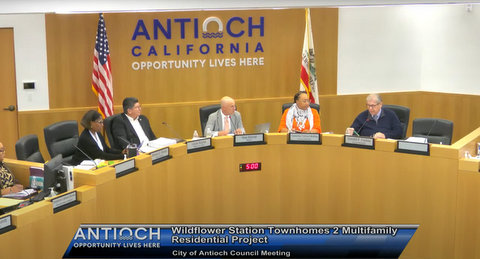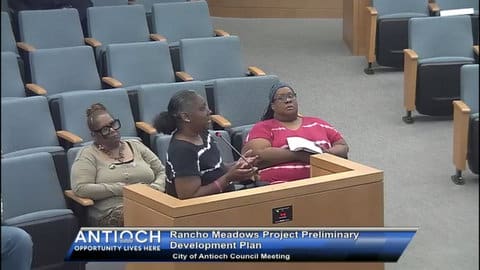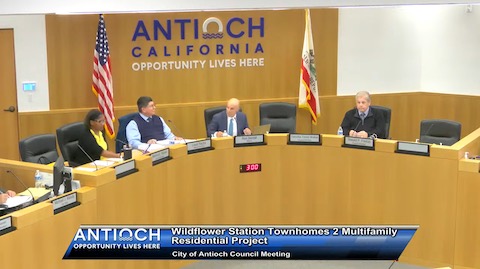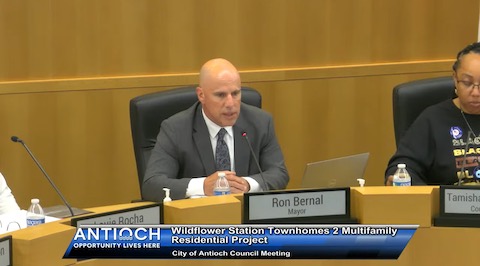
29 Sep Housing Developer Says Antioch Can’t Deny Projects. Officials Want to Try Anyway

Antioch City Council members on Sept. 23 again raised concerns with proposed housing developments. (Screenshot captured by Samantha Kennedy / The CC Pulse)
By Samantha Kennedy
Antioch officials don’t want two new housing developments in their city, because of ties to an alleged past corruption scheme, impeding economic development, and a lack of affordable units. But the developer says it doesn’t have much of a choice.
Council members on Sept. 23 were on the verge of rejecting two DeNova Homes developments that could build around 300 new residences but delayed the decisions after warnings they might violate state law.
DeNova submitted the two projects, the Slatten Ranch Townhomes and the Wildflower Station Townhomes 2 Multifamily Residential, in 2023 under SB 330.
Known as the Housing Crisis Act of 2019, the law aims to increase the construction of new residential units by removing some barriers set in land use and zoning laws in jurisdictions.
“What that means is, a project simply can’t be denied on the basis of a standard that wasn’t in effect at the preliminary application,” said Dan Golub, a lawyer for DeNova. “To disapprove (the Wildflower Station) project would be plainly unlawful.
Golub said rejecting either project means the city could open itself up to “substantial” liability.
“I feel like this council and others have a gun to our head, saying, ‘You know what? Y’all are not moving fast enough, so the state of California is going to make a decision for you,’” said council member Don Freitas. “That’s what worries me the most.”
Freitas said the law gives the council “literally very few” options to say no to developments like this.
Slatten Ranch project ‘doesn’t belong’ in proposed location, says Freitas
The Slatten Ranch project would bring 129 townhouse units to a 6.41-acre site, north of Wicklow Way and west of Empire Avenue. It would include a dog park and open space located in the northern part of the project.
In 1998, the project area was designated to be developed for future commercial and employment projects. But the council in 2023 changed that designation to plan for additional housing needs in the city, which allowed the project area to be rezoned for residential use.
Freitas, who served on the council shortly after the 1998 designation, said that the project “doesn’t belong” in the space because it wasn’t what the city had envisioned it to look like.
“While housing is critical, so is economic development,” said Freitas. “This is the beginning of the end for economic development in this particular location.”
Council member Monica Wilson said that the state law, authored by former state Sen. Nancy Skinner, D-Berkeley, had urban areas in mind rather than places like Antioch.
Wilson also raised environmental concerns with the project, but Golub noted that Slatten Ranch and the Wildflower project were both exempt from requirements under the California Environmental Quality Act.
Andrew Becker, a regular speaker at City Council meetings, and council member Tamisha Torres-Walker placed more of a focus on the lack of affordability included in the two projects.
Becker questioned how the project would serve housing needs in the community, saying that a good chunk of developments in the city are targeted to moderate-income residents when there is a higher need for housing for low-income residents.
The city has made strides to address homelessness and housing needs, eyeing an Inclusionary Housing Ordinance, moving forward with transitional housing, and directly supporting residents who are homeless.
Residents also have had a hand in holding developers accountable. Becker and other residents have refused to let up on the importance of affordability in developments.
Last year, DeNova proposed another 143 homes to the council. Six of those were set to be affordable through its nonprofit, the Yellow Roof Foundation, but Becker says they’ve since walked away from the affordable units.
“Do you care about Antioch? You sent your lawyer up here to put everyone’s hands behind their backs,” said Becker. “If you have any decency and heart and you hear a community’s needs, you would work to amend this application (for mixed-use development).”
Wildflower Station project
Discussion on the larger of the two developments was shorter but revealed similar opposition.
Located on a 10.35-acre site, the Wildflower Station 2 project is one part of the larger Wildflower Station project, consisting of more than 20 already built homes. The project at Deer Valley Road and Hillcrest Avenue would have 159 townhome condos and two play areas.
Staff initially recommended that the City Council approve both projects, saying that both met the standards necessary for development.
The initial approved 2018 plan included a commercial component to complement the residential, which was taken out.
“If the commercial was left in, it would have been a great project,” said Wilson.
Mayor Pro Tem Louie Rocha also referred to former DeNova developers David Sanson and Trent Sanson allegedly trying to bribe a city council member to help approve a housing development. At the time of the alleged bribery, Sanson was the CEO of DeNova.
“We have worked hard to clean up corrupt policing, and now we’ll roll out the red carpet for this developer,” said resident Melissa Case.
DeNova told The San Francisco Chronicle after the father-son duo were indicted on the federal charges that the company was not implicated in the alleged scheme.
Assistant City Attorney Kevin Kundinger suggested the council delay the votes so staff could conduct additional analysis on the projects.
Council members plan to consider the fate of the two developments at a meeting in October.






No Comments